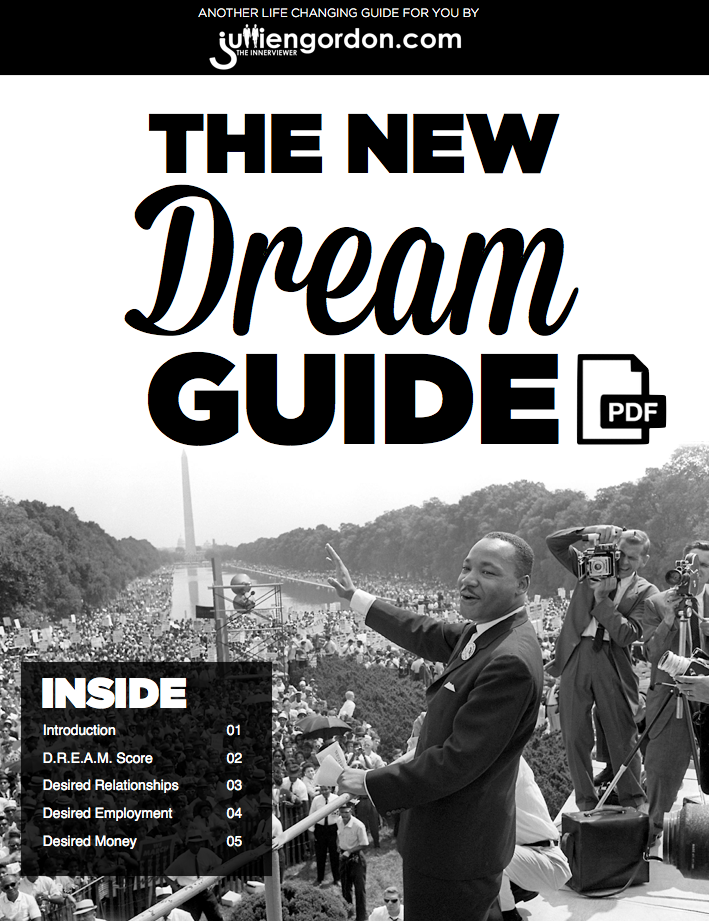9 Steps To Dream Awake Like Martin Luther King Jr. |
Dr. King’s I Have A Dream Speech inspired us to dream bigger. But 50 years later, are we any closer to living our dreams individually or collectively? Answer these 9 questions and find out…
Happy Martin Luther King Jr. Day!
I hope you’re enjoying your day off.
It’s kind of ironic that we get a “day off” to celebrate a man who dreamed awake every day. He definitely didn’t get MLK Day off. Dr. King was definitely an example to us all, but I know he wasn’t the only one with a dream.
You have dreams too.
When we’re not living our own dream, we must be living someone else’s. That’s why so many people daydream on their day job or only dream at night.
The classic American dream of a nuclear family that goes on trips to Disney Land and has a four-bedroom home and a mini-van and sports car is fading. It’s not fading because it is impossible to achieve, but because one size no longer fits all, and each person is starting to define the dream for him/herself.
Dreams are usually considered those ethereal things that you can’t touch or ever realize. For us, a dream is not a destination—instead it’s a way of being. To be fully alive means to D.R.E.A.M. awake, not day-dream or dream while asleep. What would it look like if you were living your dream every day? Each person must determine his or her individual balance between relationships, employment, and money in order to live the D.R.E.A.M.
Today is a time to D.R.E.A.M. awake.
To D.R.E.A.M. awake means to have your…
Desired
Relationships,
Employment,
And
Money.
Dreams don’t have to be so ethereal…intangible…untouchable…unreachable.
They can be real…tangible…touchable…reached.
If you’re still chasing your dreams, you’re not running fast enough
So how do you know if we’re living your dream or not?
I think these 9 yes-or-no questions will help you figure it out.
Desire Relationships
Relationships involve your significant other, children, parents, siblings, extended family, friends, colleagues, and community at large. It also includes your relationship to things that don’t involve other people such as yourself, your spiritual source, money, fear, food, trust, love, and so on. We want to ensure that all of your relationships are as healthy as possible.
The Questions:
1. Are you in communication with your spiritual source?
2. Are you in communion with your family?
3. Are you in community with your friends?
Desired Employment
Employment includes your paid work and free work (a.k.a. volunteering). Paid work is likely your full-time job. For most, it involves using their skills to create value forty hours per week. That work can and should be fulfilling—it can and should pay you in intrinsic ways that transcend money. Over half of your waking hours will be at your job, so it’s important that your job fulfills you rather than depletes you. Free work involves how you invest your time serving others outside of paid opportunities. This may involve serving in your church, being on the board of a nonprofit, or tutoring youth on evenings or weekends.
The Questions:
4. Are you able to create value?
5. Are you being valued?
6. Are you doing work that aligns with your values?
Desired Money
Money involves your income and assets. How much do you make a month? How much do you keep a month? How much do you have saved? How much do you need to live your D.R.E.A.M. life—do what you want to do and have what you want to have with the person with whom you share your life? Very few people have ever calculated the answer to the question, so they end up playing the profit maximization game; they seek the job that makes them the most money, but it doesn’t necessarily make them happy. Keep in mind that your income is not what your employer pays you—that’s your revenue. Your income is what you keep after all of your expenses (e.g., rent/mortgage, food, phone, utilities, travel, etc.) are subtracted from your revenues. There are many people who make six-figures in revenue per year from their jobs, but have no income at the end of the year because of their expenses.
The Questions:
7. Have you defined what’s enough?
8. Do you have enough?
9. Do you know your value outside the context of a job?
Are you D.R.E.A.M.ing awake?
For some people, money is everything, and they are willing to work a job they hate and sacrifice their relationships to maximize their financial bottom line. For some people, the job itself is everything, and they will give up income and relationships as long as they are doing what they love. For others, relationships are everything, and it doesn’t matter where they work or how much they make as long as they can work with people they care about—colleagues and clients—and afford to be with their loved ones. The trick is that you can’t maximize all three. It’s like juggling: you need coordination to handle three balls with two hands. Therefore, we each must find our work-life-money balance in order to find our happiness. If you try to copy someone else’s balance because of his/her perceived happiness, first know that it’s perceived, and two, what’s best for others is likely not best for you.

Get My New D.R.E.A.M. Guide For Free
[embed_popupally_pro popup_id=”7″]
Share your thoughts, questions, opinions, & feedback
Get My New D.R.E.A.M. Guide For Free
[embed_popupally_pro popup_id=”7″]




